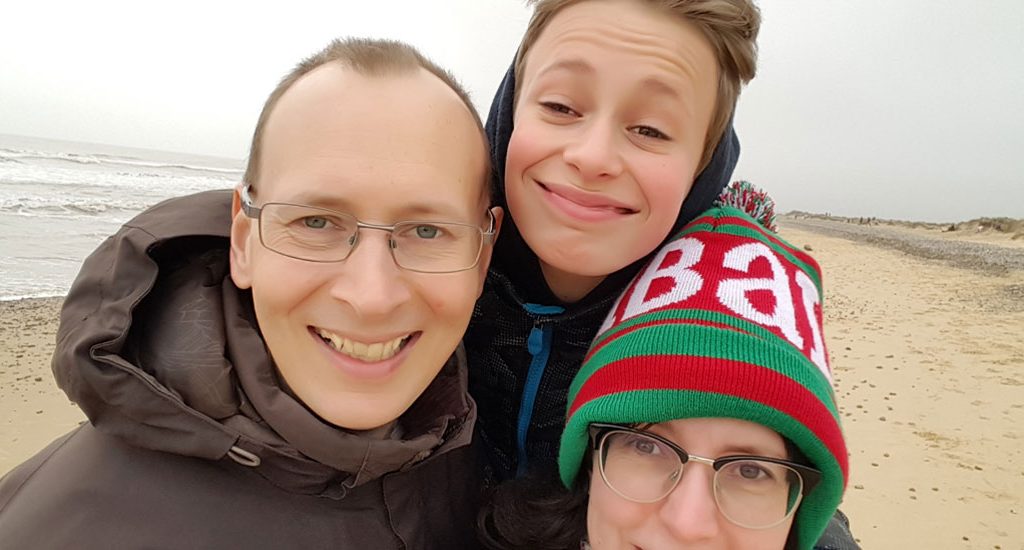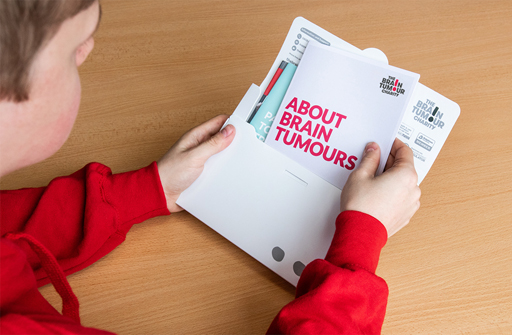High grade brain tumours
Each year in the UK, approximately 5,000 people are diagnosed with high grade fast-growing brain tumours.
What is a high grade brain tumour?
High grade brain tumours are classified as grade three or four. They:
- are fast growing
- can be referred to as ‘malignant’ or ‘cancerous’
- are more likely to spread to other parts of the brain
- may come back, even if intensively treated
- cannot usually be treated by surgery alone and often require additional treatments.
Is it brain cancer?
High grade brain tumours are also referred to as grade three or four brain cancer.
Occasionally, people will refer to these as ‘stage three’ or ‘stage four’ brain cancer. However, the word ‘stage’ is the incorrect term for discussing brain cancer, although it is often used when talking about other forms of cancer. This is because the term ‘stage’ refers to the spread of cancer throughout the body, as brain tumours rarely spread outside of the brain they are classified by their ‘grade’ i.e. growth rate within the brain.
Grade one and two brain tumours grow more slowly and are usually non-cancerous. They are often referred to as ‘low grade tumours’.
Click here to find out more about brain cancer.
What are ‘mixed grade’ tumours?
Some tumours contain a mixture of cells with different grades. The tumour is graded according to the highest grade of cell it contains, even if the majority of it is low grade.
Types of high grade brain tumour
There are over 130 types of brain tumour, as classified by the World Health Organisation accounting for both high grade (cancerous) and low grade (non-cancerous). Here we list some of the more common high grade brain tumours for adults and children:
-
The most common type of primary brain cancer in adults is glioblastoma.
There are both primary and secondary types of glioblastoma. Primary glioblastoma originates in the brain and first appears as a grade four glioblastoma.
Often, secondary cancer refers to the spread of cancer from one part of the body to another, however a secondary glioblastoma still originates in the brain but has developed from a lower grade brain tumour type, known as an astrocytoma.
-
Medulloblastoma is the most common high grade childhood tumour, accounting for 15-20% of all childhood brain tumours. They are commonly found in children between ages of three and eight, with a higher occurrence in males.
Diffuse Intrinsic Pontine Glioma or ‘DIPG’ has recently been renamed ‘Diffuse Midline Glioma’ and is the second most common type of primary, high grade brain tumour in children.
The majority of DIPGs are astrocytomas. Although the structure of DIPG cells resembles that of high grade astrocytomas originating in other parts of the brain, there are also a number of possible differences which researchers are currently trying to identify and explain.
How are high grade brain tumours treated?
Several factors influence the decision as to which treatment will best help you.
A team of specialised health professionals will consider your individual diagnosis and take account of factors, such as the size and location of the tumour, the type of tumour you have and how quickly it is growing. They will also consider your age and general health.
Standard treatments for high grade brain tumours include:
-
You may undergo surgery for a variety of reasons such as:
- whole or partial removal of your tumour (craniotomy)
- diagnosis of tumour type (biopsy)
- as part of chemotherapy treatment
- or for reducing associated conditions, such as hydrocephalus, by putting in a shunt.
Whenever possible, your neurosurgeon will try to remove all of your tumour, or as much as is safe to.
It is important to know that neurosurgery is not always possible. If your brain tumour is too close to an important part of the brain, surgery may be too risky. In this case, another treatment option will be suggested.
-
If you have been diagnosed with a high grade brain tumour, there are a variety of possible treatment options. One of these is radiotherapy. It may be used on its own, or in conjunction with other treatment options, such as neurosurgery or chemotherapy.
Radiotherapy uses controlled doses of invisible, high energy beams of charged particles to destroy tumour cells whilst causing as little damage as possible to surrounding cells.
It may be used:
- where surgery isn’t possible
- after surgery to kill any remaining tumour cells
- to prevent a tumour from returning
- to slow down the growth of the tumour.
-
One of the treatments your medical team may offer is chemotherapy. This is the use of drugs to destroy tumour cells by disturbing their growth. Chemotherapy can be used as a treatment on its own, or it may be used with or after surgery or radiotherapy.
Chemotherapy is the use of cytotoxic (anti-cancer) drugs that affect the growth of tumour cells by interfering with the way they divide and create copies of themselves.
Chemotherapy acts on all dividing cells, including healthy cells, but healthy cells are able to repair themselves better than tumour cells, so fewer of them die after treatment.
Living with a high grade brain tumour
A brain tumour diagnosis is devastating. It can be very difficult to accept and can change your life in many ways. It can have a significant impact on your social, physical, functional and emotional well-being.
-
Brain tumours may cause effects that can have an impact on your quality of life. They can affect different parts of the brain which control different functions. This means that the effects of a brain tumour you may experience depends on the location, its size and its aggressiveness.
Find out more information about the common side-effects of a brain tumour and discover some of the strategies our community has found useful to cope with them.
-
If you have a high grade brain tumour, it is likely that in the eyes of the law you are considered to have a disability, even though you may not see yourself that way.
This can have implications on your day-to-day life and leave you with questions like:
- I’m struggling financially, am I entitled to any government benefits?
- Can I drive with a brain tumour?
- What about my job… can I still work?
- Can I get health insurance?
Support and Information Services
Research & Clinical Trials Information
You can also join our active online community.
In this section

Get support
If you need someone to talk to or advice on where to get help, our Support and Information team is available by phone, email or live-chat.
Recommended reading
Share your experiences and help create change
By taking part in our Improving Brain Tumour Care surveys and sharing your experiences, you can help us improve treatment and care for everyone affected by a brain tumour.

Life with a high grade brain tumour
Oliver Highway was first diagnosed with a brain tumour in April 2012, aged just 39. As a result of his tumour and its treatment, Oliver’s life was turned upside-down when he was left with speech and cognition problems. But with the help of his family, Oliver hasn’t let these side-effects hold him back.
